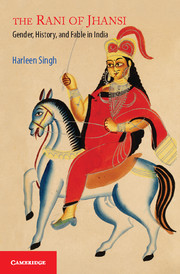Book contents
- Frontmatter
- Dedication
- Contents
- List of Figures
- Acknowledgements
- I Introduction
- II Enslaving Masculinity: Rape Scripts and the Erotics of Power
- III India's Aryan Queen: Colonial Ambivalence and Race in the Mutiny
- IV Coherent Pasts in Hindi Literature and Film
- V Unmaking the Nationalist Archive: Gender and Dalit Historiography
- Afterword
- Bibliography
- Index
V - Unmaking the Nationalist Archive: Gender and Dalit Historiography
Published online by Cambridge University Press: 05 July 2014
- Frontmatter
- Dedication
- Contents
- List of Figures
- Acknowledgements
- I Introduction
- II Enslaving Masculinity: Rape Scripts and the Erotics of Power
- III India's Aryan Queen: Colonial Ambivalence and Race in the Mutiny
- IV Coherent Pasts in Hindi Literature and Film
- V Unmaking the Nationalist Archive: Gender and Dalit Historiography
- Afterword
- Bibliography
- Index
Summary
While nationalist literature remained preoccupied with resurrecting the great individuals of Indian history, Mahasweta Devi's Jhansir Rani, published in 1956 just a decade after Vrindavanlal Varma's Jhansi ki Rani Lakshmi Bai, posited a different set of concerns and cultural logic in rewriting the story of Rani Lakshmi Bai. In this chapter, I draw attention to a little known text by Mahasweta Devi; to what it takes to negotiate the repressions and silences of colonial and nationalist archives – both anti-colonial and hegemonic ones – from a feminist lens; and to the vexed figures of history that are produced in writing against colonialist and nationalist paradigms.
Mahasweta Devi wrote Jhansir Rani, translated by Mandira and Sagaree Sengupta as The Queen of Jhansi (2000), almost three decades before she became well known in Western academic circles for her writing and activism in India. Mahasweta's biography diverges diametrically from Victorian fiction in not representing the Rani merely as a figure of convergence in Indo-British colonial relations, and nor is The Queen of Jhansi conventionally nationalist in characterizing the Rani as a forerunner of Indian independence. Instead, Mahasweta presents a biography that extols the Rani's virtues and corroborates her esteemed position in the anti-colonial struggle, yet the expected mutation into a hagiography is prevented by anchoring the narrative in regional details and by turning the biography into a larger project of recovering history and critiquing the postcolonial state.
- Type
- Chapter
- Information
- The Rani of JhansiGender, History, and Fable in India, pp. 135 - 162Publisher: Cambridge University PressPrint publication year: 2014



